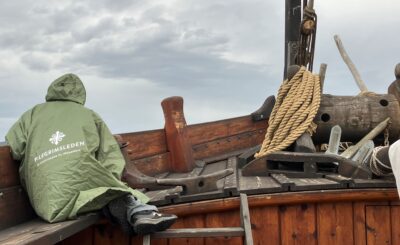Kystpilegrimsleia
Egersund - Bergen - TrondheimKystpilegrimsleia means the Coastal Pilgrim Route. It starts in the city of Egersund in southern Norway and heads north towards Nidaros Cathedral in the city of Trondheim. Kystpilegrimsleia was presumably the most used pilgrim route in Norway during the Middle Ages.
The route goes through narrow fjords and open sea, past islands, montains, bustling towns and historic fishing villages. This is a spectacular journey—whether you travel the entire way or choose a shorter section.
How to Travel
There are 25 so-called key places, or key locations, along Kystpilegrimsleia. You travel from one key place to the next, from south to north. It's not a hiking trail like other pilgrim routes, you cannot walk the whole way. You either travel with your own boat, or combine public boat transport with car or bus and walking.
You can use the website entur.no to find public transport options along the entire route. Each county also have its own travel planner services:
- Kolumbus in Rogaland county.
- Skyss in Vestland county.
- FRAM in Møre og Romsdal county.
- AtB in Trøndelag county.
There are some marked walking trails on Kystpilegrimsleia for those who wish to hike on some sections of the route, and you can bike or paddle a kayakk on some sections. At a few places you can also see and try traditional boats that are part of UNESCO’s intangible cultural heritage.
The Coastal Pilgrim Route is Open Year-Round
Kystpilegrimsleia is always accessible, as people live, travel, and work along the entire route. However, be aware that some accommodations and activities may be closed in autumn, winter, and spring. Contact one of the regional pilgrim centres for advice on the best time to travel.
If you plan to travel by your own boat, it is especially important to consider what time of year you should go, particularly if you plan to cross challenging areas such as Stad. Sudden changes in weather can bring fog, wind, rain, or even snow, so it’s wise to check the weather forecast regularly and follow local advice.
Short or Long Journey?
You decide how long the journey lasts. Most people travel for a few days at a time, while a few undertake the entire route from Egersund to Trondheim. If you plan to visit all 25 key places, you need 3–4 weeks.
It's your choice: A simple life or a touch of luxury, with others or on your own? Local food culture with white tablecloths or a packed lunch? Sleep in a sleeping bag, in a hostel, or in a hotel suite? Almost anything is possible along the coastal pilgrim route.
Planning and Travel Assistance
Have a look at the digital map of Kystpilegrimsleia. Key places, accommodations, attractions and some of the public transport stops are marked in the map. But note that the line in the map only marks an approximate route, you should choose your local route between key places based on means of transport, weather, and season.
Difficult to choose a section of the route? See our trip suggestions.
Four Regional Pilgrim Centres
Kystpilegrimsleia was officially recognized as a part of Pilegrimsleden - St. Olav Ways to Trondheim in December 2017.
There are four regional pilgrim centres along the route. Their role is to guide pilgrims within their respective regions, and they are available year-round to assist with information about their areas.
Regional pilgrim centres (listed from southernmost to northernmost):
Avaldsnes Pilgrim Center
Bergen Pilgrim Center
Selje Pilgrim Center
Smøla Pilgrim Center
Key places along the Coastal Pilgrimage Route
Key places are something very special about the Coastal Pilgrimage Route. They are places that have been selected because of their special historical and visitor qualities. Here you will find articles about all the key sites, from south to north:
Read more about key places along the Coastal Pilgrimage Route
- Egersund.
- Obrestad fyr (lighthouse) and Hå old vicarage.
- Stavanger Cathedral.
- Utstein kloster (monastery) and Utstein pilegrimsgard.
- Avaldsnes – St. Olav's church and Nordvegen History Center.
- Mosterhamn (Moster Harbor) with Moster Old Church and Moster Amfi.
- Halsnøy kloster (monastery).
- Bergen – St. Sunniva, Mariakirken (church), Lyse kloster (monastery).
- Kongshaugen in Seim.
- Kongsgarden på Lygra / Lyngheisenteret (The Heatland centre).
- Gulatinget.
- Kvernsteinsparken.
- Svanøy hovedgård (manor house).
- Kinn kyrkje (church).
- Selja Kloster (monastery).
- Herøy – Herøy gamle kyrkjestad (church site), Herøy Kystmuseum (coast museum).
- Borgund.
- Giske island.
- Veøya island.
- Kvernes at Averøy.
- Edøy island at Smøla – Edøy gamle kirke (old chuch) and Kulisteinen (stone with runic script).
- Hitra island – Dolm kyrkje (church) and the medieval site.
- Frøya and Sula, islands.
- Ørland – Austråttborgen (manor) Ørland kirke (church).
- Inner Fosen – Reins kloster (monastery) and Museet Kystens Arv (coast museum).
And then, you finally reach Trondheim – Nidaros Cathedral and Nidaros Pilegrimsgård.
Pilgrims who travels along the coast and collect at least 6 stamps in their pilgrim passport, and a stamp at Nidaros Cathedral, is intitled to the Olav letter. The letter is issued at the pilgrim reception in Trondheim.
You can buy the pilgrim passport at a regional pilgrim center along the way or order it online before your journey. The stamps can be collected from the various numbered key places along Kystpilegrimsleia, and at some pilgrim accommodations, museums etc.
Where do I buy the pilgrim passport?
You can buy the pilgrim passport at regional pilgrim centers, and at several of the attractions along Kystpilegrimsleia.
How long does it take to travel the entire Kystpilegrimsleia?
The route has 25 key places from Egersund to Trondheim, to which you can travel and pilgrimage. If you want to visit all the key locations, you should plan to use approx. 20 days or more.
What is the average distance of traveling per day?
Along Kystpilegrimsleia you may travel by public boat transport or bus from key place to key place. The daily stages will then vary with the local conditions for public transport.
When hiking, pilgrims usually walk about 20 km each day.
If a paddle or rudder, it is normal to manage approx. 25 km per day. Here, weather, wind, current and waves will be very crucial for progress.
Traditional sail / motor boats are often "slow moving" vessels, which will take longer than public transport. Traditional sailboats / motorboats are seldom accessible, and are most often set up in connection with joint / package tours. They are advertised with registration and have a limited number of seats.
Is it safe to travel along Kystpilegrimsleia?
If you travel in your own boat, the route requires experience and research prior to the jorney. You are responsible for your own safety when travelling at sea, and you must ensure that everyone on board is wearing safe life jackets. It's also important to check the weather and seek advice from locals about challenging areas like Stad. Fog, wind, rain, or snow can appear suddenly.
Familiarize yourself with the Norwegian Maritime Authority's rules of conduct. Here you can read and watch videos about the rules of conduct in Norway. It is also important to know about Redningsselskapet (the Norwegian Society for Sea Rescue), which have rescue boats all over the country.
Here you can read more about safety on hiking sections of the route.
Can I order luggage transport?
The only option for shipping luggage is with scheduled and public transport.
How is the level of accommodation?
It varies from simple self-catering cottages, to pilgrim hostels or hotels. You can see accommodations in the trip planner, where they are marked with a bed symbol.
Do I need to book accommodation in advance?
We recommend that you make reservations at pilgrim hostels and other accommodations in advance, especially at the smaller ones where there are only a few beds.
Are the churches open?
There are many beautiful churches along the way, but unfortunately not all are open. If you meet a closed door, check if there is information available which might say something about pilgrim offerings. Many congregations open the church for pilgrims by request. Information about open churches: www.kirkesok.no
Which footwear should I choose?
We recommend hiking boots with good cushioning and durability. In the west coast we recommend shoes that can withstand water.
Is Kystpilegrimsleia well marked?
The coastal pilgrimage trail is not a continuous marked hiking trail from Egersund to Trondheim. The key places are well marked, and some hiking trails are well marked. We recommend that you bring a map for safety reasons, and that you are oriented about local public transport. Contact the local pilgrim center for help.
I've packed too much and the bag is too heavy to carry, what do I do?
You could concider sending excess content by mail.
How is the weather?
The weather forecast can be found at www.yr.no.
Is there an overview of Harbours along Kystpilegrimsleia?
If you want to travel by your own boat, there are a large number of registered harbours for small boats and larger vessels along Kystpilegrimsleia. Here you will find an overview of Norwegian registered harbours: www.harbourguide.com
Here you will find information from Kartverket (the Norwegian Mapping Authority) about the sea route, ports and quays.
Can I do a pilgrimage with my dog?
It is quite possible to do a pilgrimage with your dog, but there are some things to keep in mind. It is strongly recommended to keep your dog on a leash at all times as you go through a lot of pasture where you can meet animals. By law, dogs should be on a leash from April to August, in some places it is extended.
In some areas the dog must also be able to climb stairs that have been set up to help cross fences. If not, the dog must be lifted over. For accommodation with a dog in the room this must be agreed with the owners.
If you need more help or guidance, we are always ready to help you. Contact one of the regional pilgrim centers along Kystpilegrimsleia:
Avaldsnes Pilgrim Center
Bergen Pilgrim Center
Selje Pilgrim Center
Smøla Pilgrim Center
As you travel you will come across one cultural treasure after another. Visit some of the most unique historical, cultural and geographical places along the Kystpilegrimsleia.
WHAT IS A KEY PLACE? READ MORE
Key places:
1. Egersund.
2. Obrestad fyr (lighthouse) and Hå old vicarage.
4. Utstein kloster (monastery) and Utstein pilegrimsgard.
5. Avaldsnes – St. Olav's church and Nordvegen History Center.
6. Mosterhamn (Moster Harbor) with Moster Old Church and Moster Amfi.
7. Halsnøy kloster (monastery).
8. Bergen – St. Sunniva, Mariakirken (church), Lyse kloster (monastery).
10. Kongsgarden på Lygra / Lyngheisenteret (The Heatland centre).
11. Gulatinget.
12. Kvernsteinsparken.
13. Svanøy hovedgård (manor house).
14. Kinn kyrkje (church).
15. Selja Kloster (monastery).
16. Herøy – Herøy gamle kyrkjestad (church site), Herøy Kystmuseum (coast museum).
17. Borgund.
18. Giske island.
19. Veøya island.
20. Kvernes at Averøy.
21. Edøy island at Smøla – Edøy gamle kirke (old chuch) and Kulisteinen (stone with runic script).
22. Hitra island – Dolm kyrkje (church) and the medieval site.
23. Frøya and Sula, islands.
24. Ørland – Austråttborgen (manor) Ørland kirke (church).
25. Inner Fosen – Reins kloster (monastery) and Museet Kystens Arv (coast museum).
26. Trondheim – Nidaros Cathedral and Nidaros Pilegrimsgård.
Route suggestions along Kystpilegrimsleia
[[ notice ]]
We found no trail suggestions.
Try to filter on something else.

